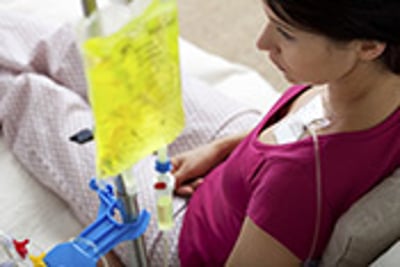All XRAYs



Relevance: Medium-High
Most relevant for: People diagnosed with breast cancer
Article: Coping with the financial burden of breast cancer
U.S. News & World Report recently talked to three breast cancer survivors, including two young women, about how they handled out-of-pocket costs and other medical expenses after their cancer diagnosis. (Posted 1/4/18)
READ MORE ›


Relevance: Medium-High
Most relevant for: Women with early-stage ER-positive breast cancer
Study: Does extending hormonal therapy impact risk of breast cancer recurrence?
Hormonal therapy significantly reduces the risk of recurrence for women with early-stage estrogen receptor-positive breast cancer. Standard hormonal therapy is given for 5 years; extending that therapy for a longer period offers additional protection but has added side effects. This study looked at women who stopped hormonal therapy after 5 years and identified factors that may guide the decision to extend treatment. (12/21/17)
READ MORE ›


Relevance: High
Most relevant for: Young women on, or considering taking hormonal birth control
Study: Birth control and breast cancer risk among younger women
On December 7, 2017 the New England Journal of Medicine published results from a study by Lina Mørrch of the University of Copenhagen and colleagues showing that hormonal contraceptives (birth control) increase the risk of breast cancer. The study is unique because it is one of the first to specifically assess the breast cancer risk associated with newer, low-dosage methods of contraception. The large and significant effort analyzed medical data of nearly 1.8 million young women in Denmark on average for over 10.9 years. Results were covered widely in the U.S. by many major media outlets, including the New York Times, USA Today, Forbes and Time. (12/14/17)
READ MORE ›


Relevance: Medium-High
Most relevant for: Women with dense breast tissue on mammograms
Article: Dense breasts and mammograms: Jill Goodacre’s story
Korin Miller’s piece for SELF magazine focuses on why women with dense breasts may need more than a screening mammogram. Miller highlights the recent story in People magazine of Jill Goodacre, a former Victoria’s Secret model and the wife of recording artist and talk show host Harry Connick Jr. Goodacre told of her breast cancer diagnosis 5 years ago after having additional screening of her dense breast tissue following a normal mammogram. (12/8/17)
READ MORE ›


Relevance: Medium-High
Most relevant for: People referred to a genetic counselor or those considering genetic testing
Study: Genetic counseling by phone or face-to-face
Results presented at the 2017 American Psychological Association’s annual meeting showed genetic counseling by telephone is as “safe and effective” in long-term psychological and social outcomes compared to traditional in-person counseling for women at risk for hereditary breast and ovarian cancer. This presentation is an update on research published in 2014. (11/29/17)
READ MORE ›


Relevance: Medium-High
Most relevant for: Women diagnosed with ER-positive, Her2-negative early-stage breast cancer with 0-3 positive nodes
Guideline: Can MammaPrint guide treatment decisions?
The American Society of Clinical Oncology (ASCO) updated its guidelines for MammaPrint, a genomic tumor test that guides treatment decisions for patients with early-stage invasive breast cancer. The update was based on results from the MINDACT study (11/16/17).
READ MORE ›


Relevance: Medium-High
Most relevant for: people with an inherited mutation linked to cancer risk
Article: Preimplantation genetic diagnosis and hereditary cancer
Andrew Joseph’s piece for STAT, “A baby with a disease gene or no baby at all: Genetic testing of embryos creates an ethical morass,” focuses on preimplantation genetic diagnosis (PGD) and the emerging ethical issue in the field of reproductive medicine: What to do when patients seeking to get pregnant select embryos with DNA that could lead to a disease or a disability. (11/8/17)
READ MORE ›


Relevance: High
Most relevant for: African American women who would like to lower their breast cancer risk
Study: Alcohol and breast cancer risk in African American women
The link between alcohol intake and breast cancer is well known, but most studies have involved only White women. Recently, a large study of more than 22,000 African American (AA) women found that similar to White women, increased alcohol consumption is associated with a greater risk of breast cancer. (10/27/17)
READ MORE ›


Relevance: Medium
Most relevant for: People who are considering or have had direct-to-consumer testing
Article: Mixed reviews of at-home genetic testing
National guidelines recommend that patients meet with a genetics expert before undergoing genetic testing for cancer risk. Genetic counseling can help patients decide whether genetic testing is right for them and order the most appropriate test. Once test results are available, genetics experts also help patients understand their results. Over the last decade, the popularity of direct-to-consumer (DTC) genetic testing, such as 23andMe has grown. Some genetic tests are marketed to consumers on television, in print advertisements, and on the Internet. These “at-home” genetic tests give people direct access to their genetic information without first involving a healthcare provider in the process. A recent report outlines the benefits and limitations of DTC genetic testing. (10/20/17)
READ MORE ›


Relevance: Medium-Low
Most relevant for: Newly diagnosed breast cancer patients
Study: Can chemotherapy before surgery fuel breast cancer metastasis?
Some breast cancer patients are given neoadjuvant (before surgery) chemotherapy. However, some recent studies have raised concerns that neoadjuvant treatment might actually trigger cancer spread in certain situations. In the current study, researchers used mouse models and human breast cancers to explore this possibility. (10/10/17)
READ MORE ›